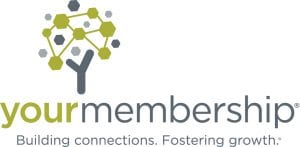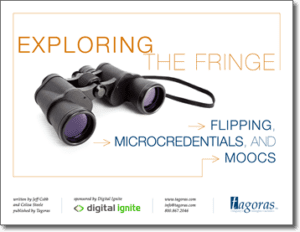Digital credentials and badges make it easier than ever to document learning while also providing tremendous value and opportunity to both learners and organizations alike – and that value can extend far beyond simply supporting the verification of learning.
Jonathan Finkelstein, founder and CEO of the digital credential service provider, Credly, is an author and frequent speaker on digital credentials and the future of learning and workforce development – he’ll also be co-facilitating the session, How Digital Badges Help Associations Recruit, Engage, and Empower Members at our upcoming virtual conference, Learning • Technology • Design™ (LTD).
In this episode of the Leading Learning podcast, Celisa talks with Jonathan about what smart organizations are doing with digital credentials, the opportunities they create for associations, and ways that organizations can get started using them.
To tune in, just click below. To make sure you catch all of the future episodes, be sure to subscribe by RSS or on iTunes. And, if you like the podcast, be sure to give it a tweet!
Listen to the Show
Read the Show Notes
[00:20] – Thank you to YourMembership, sponsor of the Leading Learning podcast for the first quarter of 2017. YourMembership’s learning management system is specifically designed for professional education with a highly flexible and intuitive system that customizes the learning experience. The LMS seamlessly integrates with key systems to manage all of your educational content formats in one central location while providing powerful tools to create and deliver assessments, evaluations and learning communities. Support your learning strategy across all devices and platforms, delivered to a global audience, and empower your organization to be the key education voice for your industry with YourMembership.
[1:20] – If you are a serious learning business professional committed to investing in your own professional growth and improvement, you won’t want to miss out on Learning • Technology • Design™ (LTD), our virtual conference created specifically for professionals in the business of continuing education and professional development.
[01:57] –Highlighted Resource of the Week – Given the focus of this interview, we are highlighting our whitepaper,Exploring the Fringe: Flipping, Microcredentials, and MOOCs. Here we take a look at each of those trends in detail and discuss when each might make sense for an association to pursue as well as some factors to consider before jumping on the bandwagon.
[02:53] – A preview of what will be covered in this podcast where Celisa interviews Jonathan Finkelstein, founder and CEO of the digital credential service provider, Credly.
[04:35] – Introduction to Jonathan and some background information about himself and what inspired the creation of Credly.
[06:57] – Would you define the term digital credential? And is that term synonymous with digital badge? Jonathan explains that there are still a lot of people trying to answer that question but he defines a credential as any claim that is verifiable by some other party – or something that isn’t self-reported information. He takes an open view of what a credential is because in different contexts they can come in different denominations of currency/sizes. Jonathan defines a badge as a vehicle to transmit that information – it could represent an entire degree/professional certificate or it could be for one very discreet skill.
[10:09] – What’s the relationship between digital credentials and learning? For Jonathan, a credential is a marker in time – a way for learners to look back at what they’ve accomplished with that learning while also looking forward at the same time to see how they can apply it/what to do next. Essentially, a credential is a proxy for learning and for demonstration of skills and knowledge.
[11:52] – What do you see smart organizations doing with digital credentials? Jonathan says that smart organizations are naturally coming to incorporating the idea of digital badges and credentials into what they do. This is because just as they are a proxy for a lot of inputs, they are also representing a convergence of a lot of important themes for associations that come together in a badge. Many associations are understanding that digital credentials are a way of fostering member engagement. Associations bring the credibility of a third party because they have a good understanding of what people should be able to at different stages of their career. There is also an opportunity for associations to project the value of their brand because digital badges are a walking advertisement for the kinds of programs offered. In addition, they offer a great way to build relationships with members, as well as help with recruitment and retention.
[15:49] – Jonathan shares the changes he’s noticed in his time working with digital credentials:
- Organizations are now bringing more stakeholders to the launch of a digital badge/credential program – they recognize that this is a story about improving marketing as much as it is about improving educational programs/outcomes or partnerships between industries and the associations that they serve.
- Organizations recognize that an investment in a digital credential program pays dividends in a number of different ways. This has led to an increased understanding of ROI of a digital badge program.
- Organizations are focusing on issuing badges that provide the most meaningful value/outcomes.
[19:46] – What’s on the horizon for digital credentials? What new developments do you think we’ll see in the coming years? Jonathon predicts the use of digital badges and credentials to catalyze the association portion of our economy/ecosystem to be in a much stronger position to play a role in lifelong learning. As digital credentials are helping people see outcomes in ways that are not just “degree-centric”, associations will be able to assert themselves in stronger ways as part of a way of filling needs within the labor market (he shares a few examples of this).
[22:43] – If a podcast listener is wondering how to get started with digital credentials at their organization, what do you recommend? What’s the first step to get started? Jonathan shares two ways to get started:
- Look at what your organization currently offers as a credential or some recognition of achievement that should be digitized. See what easy transformations from analog to digital can be made and then begin to issue in digital format using open standards.
- Inventory the ways your programs allow your members to leave a mark and showcase what they know. See if there are ways to create a digital badge program that actually fill in the gaps and recognize learning and outcomes where they aren’t already being recognized.
[26:26] – Jonathan notes the key barriers he sees to implementing digital credentials:
- Not knowing where to start and thinking you need the whole structure/blueprint in place before you can begin. While it’s nice to have a general blueprint of how all of your credentials will be mapped out, it’s not necessary. You can start with the credential you’re ready to issue, digitize that, and then fill in gaps later – in doing this, you will also learn a lot about what your members/audience values.
- Wondering what the value of the badge will be or if it will cause confusion. This is addressed by talking to the third party that would value this to get their input.
[29:02] – What’s your approach to your own lifelong learning? Jonathan shares that the most important thing to him is making sure he has access to interesting people with different perspectives/skills than he does who can point him to territory he wouldn’t typically go, as well as to challenge and push him outside of his comfort zone.
[30:11] – How to connect with Jonathan:
Website: https://credly.com/
Twitter: @JEFinkelstein and/or @Credly
[30:40] – Wrap Up
Thanks again to YourMembership for sponsoring of this episode of the Leading Learning podcast.
If you are getting value from the Leading Learning podcast, be sure to subscribe by RSS or on iTunes. We’d also appreciate if you give us a rating on iTunes by going to https://www.leadinglearning.com/itunes.
Also, please tell others about the podcast. Go to https://www.leadinglearning.com/share to share information about the podcast via Twitter, or send out a message on another channel of your choosing with a link to https://www.leadinglearning.com/podcast.
[32:28] – Sign off





Leave a Reply